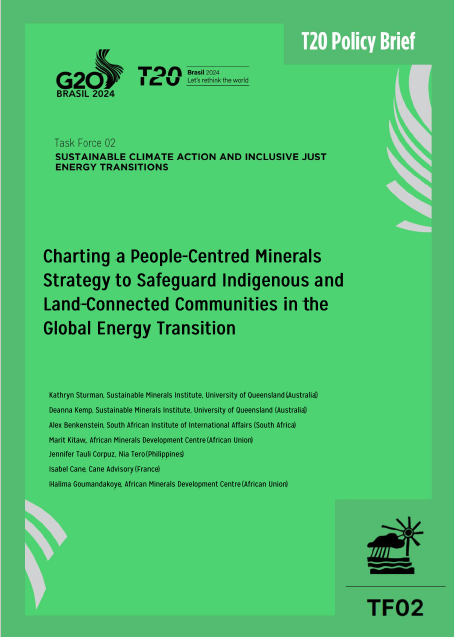Resource-rich countries of the G20 face a new policy paradox in the transition away from fossil fuels.
Critical minerals are essential for low-carbon technologies, but the scale and pace of mining required to meet demand poses risks to the environment and communities at a local level. It is estimated that 69% of global reserves of critical minerals are located on the lands of Indigenous and land-connected peoples.
This policy brief builds on the G20 New Delhi Leaders’ Declaration (2023) commitment to support “reliable, diversified, sustainable and responsible supply chains for energy transitions, including for critical minerals”, and other important initiatives, such as the Panel on Critical Energy Transition Minerals appointed by UN Secretary-General António Guterres in April 2024. The recommendations align with the
Sustainable Development Goals 7, 10, 12, 13 and 16, and the mining policy frameworks of the Intergovernmental Forum on Mining (IGF), the AU, EU and other intergovernmental organisations.
We recommend a G20 Safeguards in Minerals Mapping and Analysis Programme (SiM-MAP), for identifying and synthesising data on the intersection of critical minerals with areas of social and environmental risk, to better inform public policy and regulation.
The programme would exchange knowledge of where minerals exploration and development overlaps with sensitive areas, and other risk factors, such as low human development, food and water insecurity, gender inequality, high biodiversity value, cultural heritage, conservation and conflict-affected areas.
Recommendations include to better integrate safeguards for mining projects within regulation and fund in-depth social science research on critical minerals development. Strategic partnerships, dialogue and
participatory monitoring of policy implementation draws on the local knowledge systems of Indigenous and land-connected peoples for a just energy transition.
Language: English
Publisher: T20 Brasil 2024
Region: Global
Type: Occasional Paper
CITATION
Kathryn Sturman, Sustainable Minerals Institute, University of Queensland (Australia); Deanna Kemp, Sustainable Minerals Institute, University of Queensland (Australia); Alex Benkenstein, South African Institute of International Affairs (South Africa); Marit Kitaw, African Minerals Development Centre (African Union); Jennifer Tauli Corpuz, Nia Tero (Philippines); Isabel Cane, Cane Advisory (France); Halima Goumandakoye, African Minerals Development Centre (African Union); Charting a people-centred minerals strategy to safeguard Indigenous and land-connected communities in the global energy transition.
